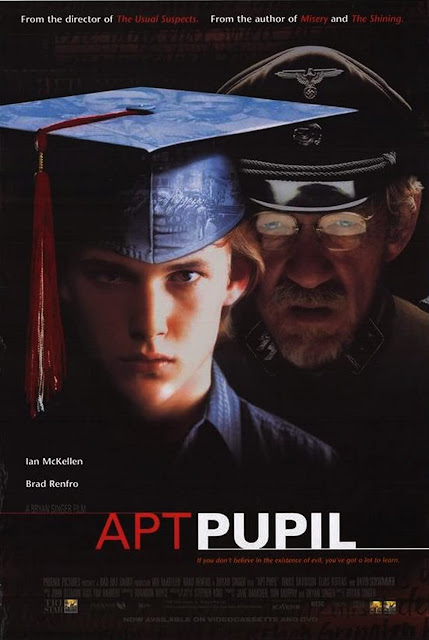Stephen King has seen more
adaptations of his written body of work than any other writer living or dead,
except maybe for Bram Stoker, whose novel, Dracula,
has been adapted for a literal, accurate, and confirmed figure of ninety
bajillion times. As such, among these King adaptations, some are classic, some
are decent, and some are best forgotten. His 1982 four-novella collection, Different Seasons, contained the
original stories that would later be adapted into Stand by Me, The Shawshank
Redemption, and then Apt Pupil.
The fourth story, The Breathing Method,
is in the works under the direction of Sinister’s
Scott Derrickson, so the Different
Seasons adaptation game is looking like a clean sweep. Not bad for one
book. (The jealous author in me weeps bitterly.)
Until Derrickson’s adaptation
sees release, Apt Pupil remains the
dark horse adaptation of the book. Having been released to mixed-to-positive
reviews back in 1999 (and mired in controversies/production difficulties), and directed by a post-Usual Suspects Bryan Singer (the X-Men series, Valkyrie), Apt Pupil
has always remained just under the radar in the King world. Headlined by Brad
Renfro (The Client), who died at the age of 25 in 2008, and whose death was overshadowed by
the passing of Heath Ledger one week later, Apt Pupil presents a young, well-to-do high school student and
all-around sociopath Todd Bowden, who deduces that an elderly member of his
community, Arthur Denker (Ian McKellen), is a former Nazi living in hiding
under an alias. Bowden, fascinated with Nazi atrocities (or perhaps just
atrocity in general), first blackmails Denker before cautiously befriending
him, wanting nothing more than to hear all of Denker’s vile holocaust stories.
And Denker, at first backed into a corner, slowly begins to spin the
arrangement to his advantage, until the two get to a point where both are
manipulating each other. As such, only one will likely walk away.
As can be expected by a King
work, Apt Pupil is very dark – not
in terms of gory visuals, but more its tone and its subject matter. There’s no
blacker stain in the world than the atrocities of Nazi Germany during World War
2; even without the grainy black and white photographs of stacked bodies and
emaciated figures, the mere discussion of it is still upsetting enough that Apt Pupil presents as a somber and
by-design upsetting experience. Singer and screenwriter Brandon Boyce don’t
back away from the darkness of the story’s subject matter, although it does
update certain aspects, such as its much more explosive finale (to be expected
in 1999’s immediate post-Columbine era).
Ian McKellen is chilling in his
role as the runaway Nazi, whose villainous turn almost laughs in the face of
his more well-known, and by comparison, lovable, take on the X-Men series’ Magneto (ironically, a
survivor of the holocaust). But in a way, it’s Renfro as Bowden who walks away
as the film’s bigger sociopath, and that’s because he wears the façade of a
sixteen-year-old kid in a varsity jacket and has a pretty girlfriend on his
arm, who society would dictate has the perfect life, and hence, is no one to
worry about. Renfro finds a way through all that and presents an angry,
confused, and severely psychotic kid for whom more teachers would write a
letter of recommendation than recommend him for psychological counseling.
(Sadly, Renfro battled with drug addiction throughout his 20’s, nearly
obtaining the lead in Freddy vs. Jason
before a bizarre incident in which he stole a yacht cost him the role.)
On the triple tier Stephen King adaptation scale, Apt Pupil rests comfortably in the upper-middle ranks. The lead performances and Singer’s direction are top notch, while the screenplay can sometimes meander, with its neutered ending sacrificing much of the impact of King’s original story. Still, it’s certainly one of the better King adaptations, with immense talent on both sides of the camera. Sadly, it’s also more relevant in the modern climate than it’s ever been before.






















